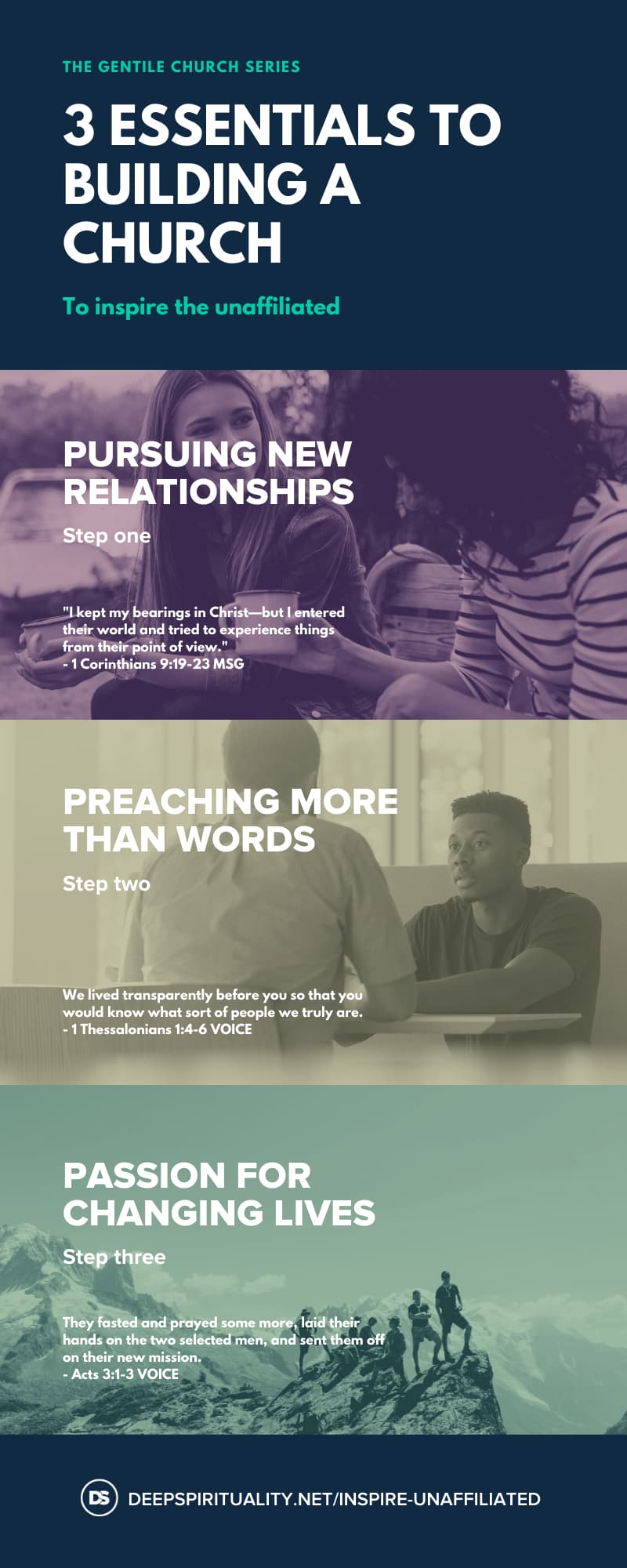Table of Contents
“I never want to come back here again!”
These were among my final words to friends upon my senior graduation from a private Christian school. I had grown cynical over the years in my outlook on Christianity and religion. I associated having faith with having to hold onto rigid traditions, trying to behave morally, and giving the right answers in my religion classes.
Though I claimed to believe in God, my life was absent any power to change. I became adept at acting like a “good Christian” during certain times and days of the week but lived a powerless religion.
It was no surprise that by the time I went to college, people asked me what church I attended or Christian denomination I grew up in, and my response was simple:
None.
Although I still had somewhat of an interest in God, I had no desire to be affiliated with any church or religious group. It wasn’t until I met friends in college that my curiosity about God was rekindled.
Changed lives light up and change the world.
Building a Church to Inspire the Unaffiliated
This happened because I saw in their lives the tangible changes and genuine inspiration to live for a purpose greater than themselves. They made God attractive through how they lived.
And I would soon learn from studying the Bible with these friends that this was God’s plan all along – that the world would know God and be changed, not in a religion class or organization, but through changed lives empowered by God.
Changed lives light up and change the world. This is what Jesus exemplified and how he inspired others to impact the world:
13 “Your lives are like salt among the people. But if you, like salt, become bland, how can your ‘saltiness’ be restored? Flavorless salt is good for nothing and will be thrown out and trampled on by others. 14 “Your lives light up the world. Let others see your light from a distance, for how can you hide a city that stands on a hilltop?
15 And who would light a lamp and then hide it in an obscure place? Instead, it’s placed where everyone in the house can benefit from its light. 16 So don’t hide your light! Let it shine brightly before others, so that the commendable things you do will shine as light upon them, and then they will give their praise to your Father in heaven.”
Matthew 5:13-16 TPT
Why the world needs the church to change
There are generally two types of people in our world today: the religious and those who are not religious.
We see this also in scripture as God’s purpose was to reach both the Jews (religious) and the Gentiles (non-religious) to bring together a world divided by hostility and discrimination into one peaceful family together – the church.
14 Christ himself is our peace. He has made Jews and Gentiles into one group of people. He has destroyed the hatred that was like a wall between us. 15 Through his body on the cross, Christ set aside the law with all its commands and rules. He planned to create one new people out of Jews and Gentiles. He wanted to make peace between them.
16 He planned to bring both Jews and Gentiles back to God as one body. He planned to do this through the cross. On that cross, Christ put to death their hatred toward one another. 17 He came and preached peace to you who were far away. He also preached peace to those who were near. 18 Through Christ we both come to the Father by the power of one Holy Spirit. 19 So you are no longer outsiders and strangers. You are citizens together with God’s people. You are also members of God’s family.
Ephesians 2:14-19 NIRV
Although many identify as being religious today, there is an increasing number of those who consider themselves religiously unaffiliated – those not belonging to a particular church or religious group:
“The number of Americans who do not identify with any religion continues to grow at a rapid pace. One-fifth of the U.S. public – and a third of adults under 30 – are religiously unaffiliated today.
Pew Forum (2012)
Pew Research has also revealed a growing lack of confidence in religion and churches’ ability to influence the world.
“Two-thirds of Americans, including 63% of the religiously unaffiliated], say religion as a whole is losing its influence on American life. A large majority of those who think religion’s influence is on the decline see this as a bad thing.”
Pew Forum (2012)
Moreover, a recent Gallup poll revealed that Americans’ confidence in the church or organized religion has decreased from 68% to 36% over the past 45 years.
Findings from these studies lead to the conclusion that the world is not getting more influenced by the church. We live at a critical time in which people are desperate for change and answers to overcome the ever-increasing darkness of racism, sexism, ageism, and elitism.
Therefore, to change the world, we must change the church. This starts with every Christian deciding to personally transform, beginning with our personal relationship with God.
Sign up for our devotional newsletter
Subscribe to My Morning Mindset, a 3-day-a-week newsletter with devotionals designed to help you experience a personal relationship with God.
We must first decide to prioritize and build such an intimate and uncompromised connection with God that God’s power and presence flow from our relationships with him. Only then can we collectively as Christians make God audible and visible through our lives both through the church and through our relationships in the world.
Three essentials to building a church to inspire the unaffiliated
To build a church today that changes the world as we see in the 1st century, we must inspire and attract the modern-day Gentiles of our times – the unaffiliated and non-religious – by making God attractive and personal.
We find a compelling example and blueprint of this in Acts 11, as God moves powerfully through disciples even amid adversity, disruption, and uncertainty.
19 Meanwhile, the believers who had been scattered during the persecution after Stephen’s death traveled as far as Phoenicia, Cyprus, and Antioch of Syria. They preached the word of God, but only to Jews. 20 However, some of the believers who went to Antioch from Cyprus and Cyrene began preaching to the Gentiles about the Lord Jesus. 21 The power of the Lord was with them, and a large number of these Gentiles believed and turned to the Lord.
22 When the church at Jerusalem heard what had happened, they sent Barnabas to Antioch. 23 When he arrived and saw this evidence of God’s blessing, he was filled with joy, and he encouraged the believers to stay true to the Lord. 24 Barnabas was a good man, full of the Holy Spirit and strong in faith. And many people were brought to the Lord. 25 Then Barnabas went on to Tarsus to look for Saul. 26 When he found him, he brought him back to Antioch. Both of them stayed there with the church for a full year, teaching large crowds of people. (It was at Antioch that the believers were first called Christians.)
Acts 11:19-26 NLT
We can learn from the believers in Antioch that there are three essential keys to building a church that inspires and reaches the unaffiliated:
- Pursuing New Relationships – Getting outside our religious bubble to get into the world of others
- Preaching More Than Words – Making God’s Word attractive through personal example
- Passion for Changing Lives – Changing lives and developing leaders through shared conviction
Through these, God moves powerfully in us collectively to change the church into one that changes the world. This is how so many Gentiles — the religiously unaffiliated — were drawn to God and his message, leading to crowds of Gentiles believing (Acts 11:221, 5).
Let’s take a closer look at these three essentials.

1. Pursuing new relationships: getting outside our religious bubble to get into the world of others
While scattered by immense persecution (Acts 8:1, 11:19), the Jewish Christians fled Jerusalem to unfamiliar regions, encountering new and different people. They eventually decided to build relationships with people from entirely different non-Jewish backgrounds — the Gentiles.
Similarly, God often allows disruptions to happen in our lives to get us out of the comfort of what’s familiar. This is how God leads us to discover opportunities to build new relationships with those he cares for and desires to save.
Upon the birth of my son and soon after discovering he had special needs, it disrupted all our familiar routines and ways we had lived as a family. However, what I initially viewed and resented at times as unwanted disruptions led me to reach out for help from other parents of special needs kids.
This was a world I was completely unfamiliar with, and later it led to many new relationships my wife and I were able to build and learn from who had no background or familiarity with God or religion. Some decided to study the Bible or serve in the community together, while others eventually became Christians.

“God often allows disruptions to happen in our lives to get us out of the comfort of what’s familiar.”
What started off as a disruption in my life became a door of opportunity to reach so many others who had no interest or experience with God, church, or religion.
Through disruption, God opens doors to undiscovered opportunities to reach new people and places. We see this in Acts 11 with God building the church in the midst of difficulty and capturing the attention of Barnabas.
Barnabas was then so inspired by how God was moving to reach Gentiles through the church in Antioch, that he was compelled to find and bring Saul (later renamed Paul) back with him to help build and teach the church there (Acts 11:25-26).
This would leave a permanent imprint on Paul — motivating him to leave behind his familiar Jewish culture to reach and relate to a people diverse and different from him. Getting outside of his own bubble, he writes to a Gentile church he later planted in Corinth:
19-23 Even though I am free of the demands and expectations of everyone, I have voluntarily become a servant to any and all in order to reach a wide range of people: religious, nonreligious, meticulous moralists, loose-living immoralists, the defeated, the demoralized—whoever. I didn’t take on their way of life. I kept my bearings in Christ—but I entered their world and tried to experience things from their point of view. I’ve become just about every sort of servant there is in my attempts to lead those I meet into a God-saved life. I did all this because of the Message. I didn’t just want to talk about it; I wanted to be in on it!
1 Corinthians 9:19-23 Msg
Pause and reflect
- How are you responding to disruptions in your life?
- How do you think God wants you to respond to these disruptions? What new opportunities to build relationships is God opening to you?
- Whose world is God wanting you to become a part of to deepen your empathy and help meet needs?
2. Preaching more than words: making God’s word attractive through personal example
I chose not to go to any church in my earlier school years for one clear reason: I saw no difference among friends who went and those who didn’t. Those who did go to church I berated for missing the Sunday morning NFL games or losing out on sleeping in.
Because I was hypocritical and powerless to overcome my struggles and sins, such as the bitterness towards my family or enslavement to impurity and status-seeking, I didn’t believe anyone else was conquering these either.
It wasn’t until friends in college showed me the truth from the Bible about who God was, who I was, and how to overcome the debilitating sins and setbacks of my past, that I began to believe. When they each shared their life and story of how the Word of God personally and practically transformed them, I was inspired and eager to learn more.
Their transparency and personal example of change inspired me, giving me hope that I too could change. This made God’s message no longer theoretical or impersonal like what I had experienced at my religious school. It was more than words.
See also: King Ahab and The Emotions of Change
God’s Word was made personal and dynamic through the examples of these friends studying the Bible with me. Their lives made God more than religion and theory. Their examples helped make the Bible relevant to me in every aspect of my life and relationships, as reflected in Paul’s word to his Thessalonian brothers and sisters:
4 O brothers and sisters loved by God, we know He has chosen you. 5 And here is why: what you experienced in the good news we brought you was more than words channeling down your ears; it came to you as a life-empowering, Spirit-infused message that offers complete hope and assurance! We lived transparently before you so that you would know what sort of people we truly are. We did it for your sake, 6 and you have modeled your lives after ours just as we are modeling ours after the Lord. You took to heart the word we taught with joy inspired by the Holy Spirit, even in the face of trouble.
1 Thessalonians 1:4-6 Voice
Pause and reflect
- Does your life make God’s Word attractive to others, especially those unaffiliated with a religion or church?
- What are you personally changing in response to the Bible? How are you inspiring and teaching others through your personal change and example?
- What do those who are not religious learn and see about God through your life? What message does your life communicate to the world?
3. Passion for changing lives: changing lives and developing leaders through shared conviction
After Barnabas had initially visited the church in Antioch, he was inspired to go and bring Saul (later renamed Paul) back there with him (Acts 11: 25-26).
They decided to stay for an entire year teaching the people, changing their lives, and becoming attached to them through shared conviction. God moved not only to change lives but to raise up a new generation of spiritual leaders passionate to change the world.
A church for the unaffiliated like Antioch grows in its impact and reach through spiritual men and women raised up to lead change in the world. Without new lives being changed and leaders being raised up, the church will grow weaker rather than stronger in its imprint on the world.
From one church in Antioch, God reached entire regions and nations:
1The church in Antioch had grown strong, with many prophets and teachers: Barnabas, Simeon (a dark man from Central Africa), Lucius (from Cyrene in North Africa), Manaen (a member of Herod’s governing council), and Saul. 2 Once they were engaged in a time of worship and fasting when the Holy Spirit spoke to them, “Commission Barnabas and Saul to a project I have called them to accomplish.” 3 They fasted and prayed some more, laid their hands on the two selected men, and sent them off on their new mission.
Acts 13:1-3 VOICE
As these leaders were sent on a mission to change lives with God’s message, God’s vision was never limited to a particular group, but rather to the rest of the world, regardless of their religious affiliation.
What made the church in Antioch so inspiring and effective in reaching the rest of the Gentiles and religiously unaffiliated was the fact that there was no single leader.
They were a diverse team of men and women leading together with shared convictions. And it was through this team of relationships that God’s message and influence expanded to the regions beyond them. Their shared mission was to teach and inspire the rest of the world how to turn to God to change their hearts and experience God’s vision for them.
Paul was a part of that great Antioch team. He was inspired to carry out this mission in obedience to God’s vision for his life and the world:
After that, King Agrippa, I could not disobey the heavenly vision. But both in Damascus and in Jerusalem, through the whole of Judea, and to the Gentiles, I preached that men should repent and turn to God and live lives to prove their change of heart.
– Acts 26:19-22 JPB
God is constantly communicating his unique vision for each of our lives.
I’ll never forget the day after I had become a Christian and been baptized (Acts 2:36-39). I was so inspired and compelled to share my newfound vision and relationship with God. I decided to call all my closest friends and extended family to share how my life had changed.
This later led to my father, cousin, and some of my non-religious friends to pursue God and study the Bible to become Christians. I’m sure they thought, if someone as cynical, selfishly ambitious, and hypocritical as I was could change, surely then God could change anyone with the help of spiritual friends.
Do you have shared convictions from the Bible with other spiritual friends? Are you living out God’s vision for your life in such a way that the non-religious are inspired by your example?
Our role as Christians is to inspire others with God’s vision and to help as many people as possible to experience an inspiring and intimate relationship with him. (Acts 26:16-20) Moreover, God did not intend for this to be done alone, but rather together as a team (like in Antioch) to build a church that changes the unaffiliated world.
Pause and reflect
- Are you passionate about raising up new leaders and changing people’s lives together?
- Are you welcoming or resisting God’s vision to reach and lead new people to discover God’s purpose?
- How can you engage with those who are not religious to make a difference for God in your community and beyond what’s familiar to you?
Explore more:
Ray Kim is a Southern California native who made the Bay Area his home after graduating from the University of California, Berkeley. He is passionate about community service, and is spearheading such efforts as the E-Hoops program at the University of San Francisco.
Ray Kim is a Southern California native who made the Bay Area his home after graduating from the University of California, Berkeley. He is passionate about community service, and is spearheading such efforts as the E-Hoops program at the University of San Francisco.





